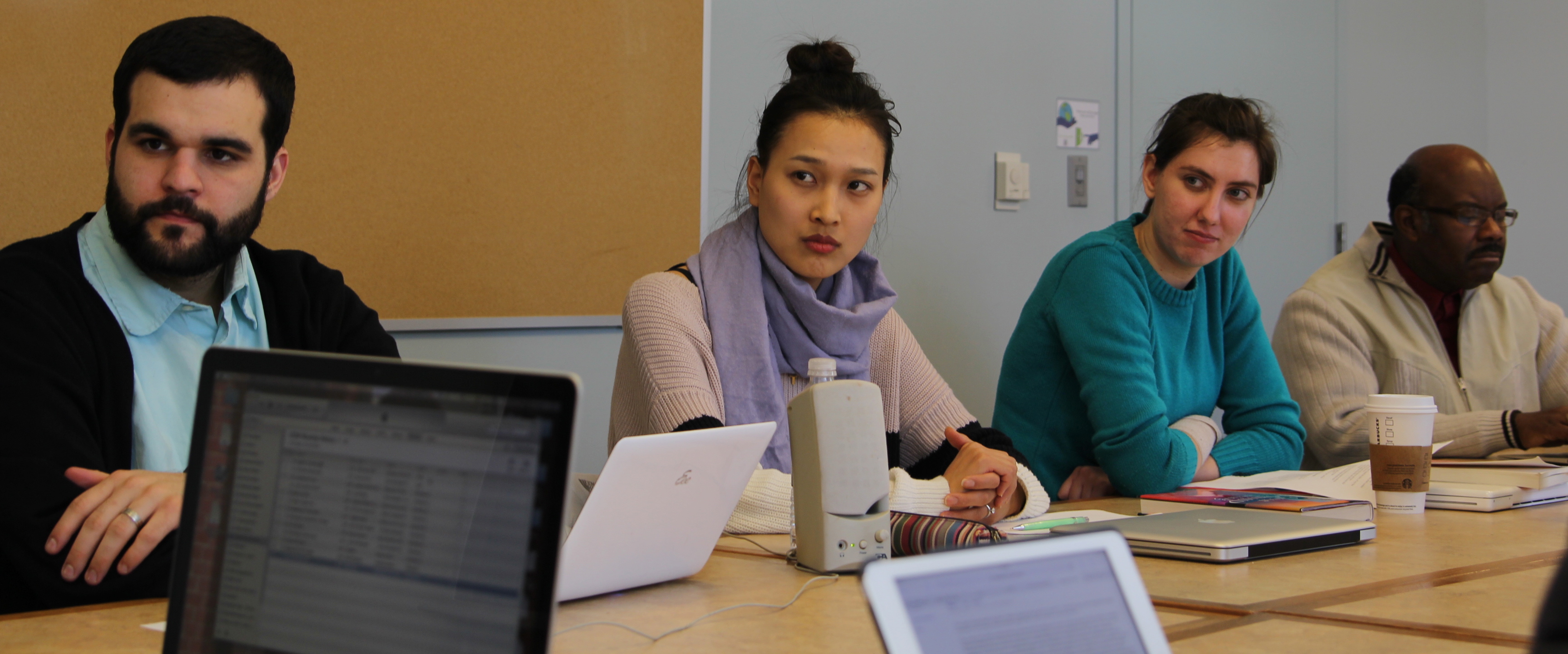Learn about all the financial aspects of studying at the ISM, including the full-tuition scholarships offered to admitted students.
Tuition
Tuition and fees for Yale Institute of Sacred Music students are set by Yale School of Music and Yale Divinity School.
Other special fees may be assessed, depending on program (orientation, commencement, board, and activity fees, etc.). Further information is available from the Financial Aid Office.
Full-tuition scholarships are available to ISM students. The amount is based on tuition established by the two affiliated schools.
Financial Aid
Full-tuition scholarships are available to ISM students to support fulfillment of their degree requirements. Additional annual merit awards of $4,000-12,000 are available to eligible ISM students. Depending on the resources of the Institute, these scholarships and awards are renewable for students who remain in good academic standing. These scholarships and awards require no application or service to the Institute.
By the beginning of their final term, students must have completed all ISM curricular requirements or be enrolled in the remaining required courses. Failure to do so will result in termination of all ISM financial aid in the final term.
Requirements for Financial Aid
Federal regulations mandate that an institution establish a reasonable SAP policy for determining whether an otherwise eligible student is making satisfactory academic progress in his or her educational program and may receive assistance under the Title IV, HEA programs, and institutional financial aid (referred to as financial aid).
The time limits for the degree programs pursued by ISM students are published in the bulletins of the respective schools. Student grades are reviewed each term to determine whether each student is making SAP. Failure to make SAP may affect the continuing of ISM financial aid.
U.S. citizens and permanent residents may also apply for federal loans and work-study, which are awarded on the basis of need as determined by federal methodology. The Institute of Sacred Music participates in the Federal Direct Loan program. To apply for a federal student loan or federal work study, students must complete the FAFSA (Free Application for Federal Student Aid).
A Federal Direct Student Loan is available as an unsubsidized loan only for graduate and professional students. Loan fees may change based on funding uncertainty at the federal level. The maximum the student can borrow through a Federal Direct Unsubsidized Loan is $20,500. The student bears the responsibility for interest on the unsubsidized loan, which may be paid as it accrues or capitalized (added to principal). Additional eligibility requirements: (1) the student must be enrolled at least half-time; (2) he or she must maintain satisfactory academic progress; and (3) he or she cannot be in default on a federal student loan.
A Federal Direct Graduate PLUS Loan is for students who need to borrow more than the maximum unsubsidized loan amount, not to exceed the cost of education. Loan fees may change based on funding uncertainty at the federal level. The interest, which accrues while the student is in school, may either be paid monthly or capitalized. Additional eligibility requirements: (1) the student must not be in default on any federal education loans or owe an overpayment on a federal education loan or owe an overpayment on a federal education grant, and must meet other general eligibility requirements for the Federal Student Aid programs; and (2) the student must not have an adverse credit history, as determined by a credit check.
Updated information about current interest rates and origination fees can be found at http://www.yale.edu/sfas/finaid/graduate-and-professional-students/gradstudentloaninfo.html.
An application must be made each year to renew the Federal Direct Loan. Laws governing these loans are under frequent review by the U.S. Congress. Applicants should be aware that awards might need to be revised if major change is mandated by government regulations.
Federal eligibility may also be reviewed during the academic year if a student’s financial circumstances change substantially; additional scholarship or award support from the ISM is not available. Students must notify the Financial Aid Office of all additional awards or sources of support, such as that received from denominational agencies, outside grants and scholarships, and parental contributions.
International students also receive full-tuition scholarship awards and may be eligible for merit awards through the Institute of Sacred Music. No application is needed, nor is service to the Institute required to receive the scholarship or award. International students are not eligible to participate in U.S. government-funded loan programs unless they are permanent residents; therefore, every effort should be made to obtain financial assistance from the applicant’s government. Such assistance should be reported to the Institute’s Financial Aid Office. The Institute cannot subsidize transportation to and from the United States.
For detailed information about all aspects of financial aid, please contact the Ben Geertz in the Financial Aid Office.
Financial Aid Links
Useful links that will help you finance and pay of your ISM education

Employment
Yale Institute of Sacred Music is a professional environment and, as such, encourages professional work. For example, Institute students are hired as musicians or in other areas of ministry in Yale’s chapels or area churches. Part-time positions abound in the libraries, dining halls, and various offices of the University. Nonetheless, the Institute does not encourage students to pursue outside work at the expense of their obligations to the Institute or their respective Schools. Students generally work between ten and fifteen hours a week (not to exceed nineteen hours per week). The Institute demands that students prepare for classes and rehearsals, attend them, and participate fully in the life of the Institute. Students shall submit requests to work outside the Institute (both for pay and not for pay) to their adviser with sufficient time to be reviewed by the director. This requirement includes any work in performances on and off campus. Forms can be obtained from the Office of Student Affairs.
Scholarships and Awards
The named scholarships are part of the Institute’s pool of resources. They honor students of exceptional promise and achievement in their field of study. The overall amount of the named scholar’s financial assistance is not affected. The Porter, MacLean, and Seder scholarships had their beginnings at the School of Sacred Music at Union Theological Seminary and were transferred to the Institute of Sacred Music upon its move to Yale University.
The Mary Baker Scholarship The Mary Baker Scholarship in organ accompanying was established in 2005 to honor the memory of Mary Baker, wife of Dr. Robert Baker, founding director of the Yale Institute of Sacred Music. The scholarship is awarded each year to a returning organ student who has demonstrated in the opinion of the faculty the ability and collaborative spirit necessary for a skilled organ accompanist.
The Robert Baker Scholarship Robert Baker is the former director and dean of the School of Sacred Music at Union and the first director of the Yale Institute of Sacred Music. This scholarship is for an organ student completing his or her first year. The scholarship was established at Dr. Baker’s retirement.
The Reverend Louise H. MacLean Scholarship An ordained minister of the United Church of Christ, the Rev. Louise H. MacLean was a graduate of Union Seminary who admired the work of the School of Sacred Music at that institution. The scholarship is to be used for the benefit of worthy students.
The Menil Scholarship A scholarship designated for a student concentrating in the visual arts. Monies are given by the Menil Foundation.
The Hugh Porter Scholarship Director (1945–60), Union Seminary School of Sacred Music, Hugh Porter was a distinguished organ recitalist and organist at St. Nicholas Collegiate Church in New York and a highly respected teacher. This scholarship is undesignated.
The E. Stanley Seder Scholarship Organist and choir director at People’s Church in Chicago, E. Stanley Seder also served as organist of the Chicago Sunday Evening Club, which met in Orchestra Hall. This scholarship is undesignated.
Yale was awarded $4.7 million from the second round of awards from the Higher Education Emergency Relief Fund (HEERF II) grants. Yale will award all of the $4.7 million, including the share that could have been applied to institutional expenses, as emergency grants to Yale students with exceptional financial need. More information about these grants can be found at heerfgrant.yale.edu.
HEERF II Appeals Process Now Open
Those students who did not receive a HEERF II grant in the first round may now appeal that decision. Students must have been enrolled in at least one semester in the 2020–2021 academic year, have received some form of financial aid (scholarship, grant, loan, or job) in the 2020–2021 academic year, and must have COVID-19 related expenses that were not covered by other forms of financial aid. In order to start the appeals process, students need to contact their school’s financial aid office. The student’s financial aid officer will determine if they are eligible to appeal and will enable them to complete the online appeals application. Final eligibility determinations will be made by the HEERF Working Group. Appeals will be reviewed in the order they are received. HEERF II appeal funds are limited and completing an application for an appeal does not guarantee the receipt of funding. The deadline for submitting an appeal is July 22, 2021.
The named awards will be given to first-year music students in addition to the usual scholarship awards, and will be renewable for a second year if progress is satisfactory.
The Baker Award Named in honor of Professor Emeritus Robert Baker, the award is given to one or more students deemed to be among the top 1 or 2 percent of the young organists in the country and who have elected to study at the Yale School of Music and the Institute of Sacred Music.
The French Award The award, named in honor of Professor Richard French, is given to one or more choral conducting students, deemed among the best in the country, who attend the Yale School of Music and the Institute of Sacred Music.
Fifth Semester for Church Music Certificate Course
Participants enroll as nondegree students for the fifth semester at the Yale Divinity School and receive a full-tuition scholarship. However, they are not eligible for Federal Direct or Graduate PLUS loans. They are eligible for alternative loans. Nondegree students are not eligible for deferral of loans. International students may need to apply for an extension of their student visas.
Special awards are also available for Divinity students selected by the faculty. The Institute is especially interested in students who demonstrate a lively interest in cross-disciplinary interaction and study.
The Institute of Sacred Music may provide limited financial support in the form of grants for student participation in competitions, professional events, summer language study, and Colloquium presentation expenses. Interested students should first consult the ISM Office of Student Affairs to ascertain the specific grants for which they are eligible. All requests must be made in advance, using the ISM Student Grant Request form, and approved by the faculty and director of the Institute. Guidelines for support may be obtained from the financial aid officer.
The Institute also underwrites the Yale Schola Cantorum, whose members receive payment for participation except if receiving academic credit for participation. Link to Performing Ensembles
Leave of Absence
For the policies regarding leaves of absence, including the U.S. military leave readmissions policy, Institute students should consult the bulletin of the professional School, Music or Divinity, in which they are enrolled, as well as the Director of the Institute.
Our Partners
ISM partners prepare students for careers in church music and other sacred music.
